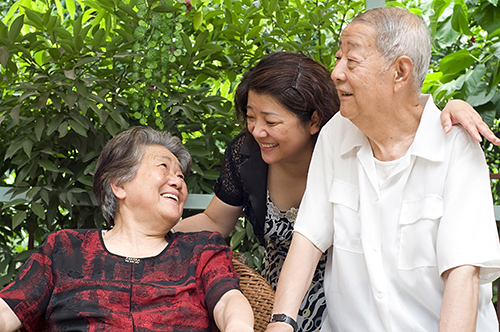Showering and personal hygiene
- Maintain simple and regular cleaning habits, set bath and toilet times, and remind patients to go to the toilet regularly.
- It is advised to take a shower. If the patient is not used to it, they will not be forced to do it.
- If the patient refuses to take a shower, do not force them to do it immediately. Wait until the patient is in a better mood.
- Allow patients to wash their body and go to the toilet as much as possible by themselves.
- Pay attention to safety by installing safety rails and non-slip mats beside toilets and bathtubs.
Repetitive behavior
- When patients show repetitive behaviors, try to distract them by offering activities for them to see, hear, or do.
- Think of a better way to answer the questions the patient often asks.

Accusing others of stealing their missing items
- Take the patient with you to the place where they like to hide things.
- Make a backup of important items (e.g. keys) and remember to check your trash can before you empty it.
- When the patient loses something, identify with them. Don't reject them all the time, while helping them find the lost thing.
- You can respond mildly to false accusations, but don't argue too much with the patient.
Illusions and delusions
- When a patient sees or hears something that does not exist, don't argue with him/her that what he/she sees is true or false. Try to distract him/her.
- When the patient is frightened, please use a gentle tone and gently hold their hands to give them a sense of security.
- Understand the medications the patient is taking and the possible side effects thereof, and perhaps adjust the medications by your physician to ease the problem.
Wandering around
- Prepare personal ID documents or bracelets or rings engraved with contact numbers or ID numbers for patients.
- Once lost and found, accept them with kindness and love. Avoid showing anger.
- Keep a recent photo of the patient handy for emergencies.
Depression and anxiety
- Discuss with your physician and ask him or her to refer you to other professional counselors, such as psychotherapists or social workers.
- Give the patient more love and support, and don't expect the patient's depression to improve immediately.
Violence or aggression
- Keep a calm and gentle attitude towards them. Don't express fear or panic. Show more acceptance and tolerance.
- Use some gentle and quiet activities to distract the patient.
- Identify the cause of the misconduct and try to avoid recurrence. If these behaviors occur frequently, seek psychiatric or other professional assistance and treatment.
Trouble falling asleep
- Avoid letting patients sleep during the day.
- Allow patients to walk more and do more activities during the day.
- Create a comfortable sleeping environment at night to help patients fall asleep easily.
Social resources
- Taichung Long-term Care Management Center
- Tel: (04) 2527-4551
- Federation for the Welfare of Taiwan’s Seniors
- Tel: (02) 2592-7999
- Website: www.oldpeople.org.tw

